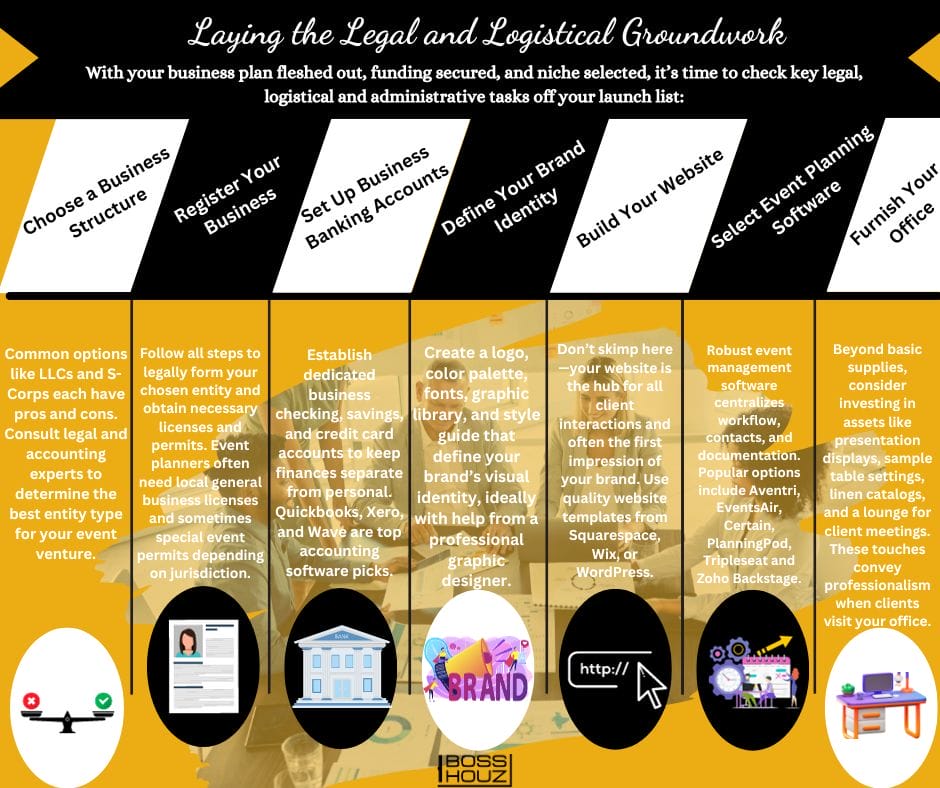The party lights dim as the DJ’s opening tracks reverberate across the dancefloor. Guests grin with delight, clasping flutes of champagne as they take in the scene—months of planning culminating in this magical moment.
For many, the thrill of event production is irresistible. As the event organizer, you get to work behind the scenes orchestrating every detail, then finally see your vision unfold in real time. It’s an immensely creative process requiring adaptability, attention to detail, and grace under pressure. When done well, event planning can be incredibly rewarding.
But where do you start if you want to turn event planning into a full-time business venture? How do you stand out and succeed in this exciting but crowded industry?
This comprehensive guide aims to answer those questions, providing aspiring event planners an in-depth look at critical steps for launching and growing a profitable event planning company. You’ll learn insider tips for navigating the unique opportunities and challenges of building an event empire from the ground up.
So whether you’re dreaming of starting a boutique wedding planning firm, a corporate event management agency, or a new kind of immersive event production company, use this article as your blueprint for strategically mapping out your success. With passion, grit, and the right knowledge, your vision can become a reality. The party is waiting—let’s get started!
Table of Contents
Understanding the Booming Event Industry
Before diving into the nitty gritty of launching your own event planning venture, it’s helpful to understand the broader industry landscape. The event world is vast and varied, offering entrepreneurs multiple pathways to carve out their niche.
A Snapshot of a Thriving Industry
The global event industry has expanded rapidly over the past decade. Pre-pandemic, the global events market was valued at $1,100 billion, with over 1 million events hosted annually in the United States alone (1).
While COVID-19 temporarily depressed the industry, the post-pandemic rebound has been swift. The global event management software market is projected to grow at a 13% CAGR through 2030, as in-person events come roaring back (2).
Several key factors are fueling this growth:
- Increased corporate spending on live branded experiences and events
- The rise of “experiential commerce” among consumers
- Technological advances enhancing hybrid/virtual event capabilities
- Renewed appetite for in-person events and human connection post-pandemic
As the demand for live and digital events continues surging, new opportunities abound for innovative event production companies.
Types of Event Planning Businesses


“Event planning” encompasses an incredibly diverse range of services and specializations. Here are some of the most common types of event planning ventures:
Corporate Event Planning
- Meetings, conferences, trade shows, galas, retreats, branded activations/experiences, and more
- A corporate event planner serves business clients and manages logistics end-to-end
Wedding Planning
- Engagement parties, bridal showers, rehearsal dinners, ceremonies, receptions
- A wedding planner helps engaged couples orchestrate their perfect wedding
Social Event Planning
- Birthdays, anniversaries, bar/bat mitzvahs, graduations, reunions, dinner parties
- A social event planner works with individuals to plan personal celebrations
Festival/Concert Production
- Music festivals, cultural festivals, conferences, tours, digital events
- A festival/concert event producer stages large-scale public events with multiple logistical components
Non-Profit Event Planning
- Fundraisers, galas, walks/runs, awareness events, virtual events
- A non-profit event planner specializes in coordinating mission-driven events
There are also hybrid event planning firms that offer an array of services. Identifying your specific niche within this ecosystem is a key strategic choice covered later in this guide.
Starting Your Event Planning Business
Now that you have a sense of the opportunities available, we’ll dive into the practical steps for getting your event planning business up and running.
Crafting a Solid Business Plan
Like any new business venture, creating a comprehensive business plan is foundational. This should cover:
- Business structure: Will you operate as a sole proprietor, LLC, S-corp?
- Business Name: What will you present to your market, how will it stick in peoples minds vs your competitors?
- Services: What specific offerings will you provide clients?
- Target customers: Who is your ideal clientele? Be as specific as possible.
- Competitor analysis: Who are you up against in your specific niche and locale? How will you differentiate?
- Operations: How will you deliver services? This covers staffing, workflows, vendors, software, equipment, and more.
- Financial projections: Estimated startup costs and operating budgets. Revenue and profitability forecasts.
- Marketing strategy: How will you promote your new business and acquire clients?
Having this plan provides a strategic roadmap as you launch and scale. It also improves your chances of securing funding.
Funding Your Event Planning Venture
Starting a service-based business has relatively low barriers to entry. But you’ll still need capital to cover costs like:
- Initial market research and business plan development
- Legal/accounting fees for establishing business entity
- Website development and branding assets
- Office space, supplies, software, equipment
- Marketing and advertising
- Working capital reserve
Common funding sources for launching an event planning business include:
- Personal savings
- Loans from friends/family
- Small business loans or lines of credit
- Business credit cards
- Crowdfunding
- Microloans or grants
- Business plan competitions
- Angel investors or VC funding (for tech-driven event startups)
Conservative financial planning is key—many new event ventures fail by scaling too quickly. Prioritize lean startup practices and aim for organic, sustainable growth.
Assembling Your Dream Team
No event planner is an island—even solo entrepreneurs need a network of talented vendors, contractors and assistants to execute successful events.
Identifying and nurturing these key partnerships takes time. Be strategic from day one about surrounding yourself with top-tier professionals who complement your skill set.
Here are some of the most vital teammates for new event planners:
- Contractors/part-time assistants: Help handle logistics and correspondence. Build a bench of backups.
- Graphic designers: Assist with branding, invitations, signage, props, and décor.
- Photographers/videographers: Document events and create shareable social content.
- Caterers: Provide delicious cuisine tailored to the event theme and dietary preferences.
- Venues: Offer well-equipped event spaces with capable operations teams.
- Transportation services: Help smoothly convey guests or cargo between locales.
- Sound, lighting, and AV teams: Handle critical tech production/equipment.
- Florists: Craft stunning floral arrangements that elevate ambiance.
- Entertainers: DJs, bands, dancers, circus performers, magicians, and other specialty acts.
Cultivating relationships with vendors takes time. Be responsive, provide clear direction, and nurture trust. These key partners allow you to focus on high-level creative direction and client relationships as the business scales.


Core Skills for Event Planning Excellence
While you can outsource specific event production tasks, there are certain innate skills and traits successful event planners require:
Immaculate Organization
Juggling countless simultaneously moving parts requires zen-like calm combined with militant organization. You must be able to create and closely track detailed project plans while maintaining perspective on the big picture.
Grace Under Pressure
With live events, no matter how prepared you are, curveballs will come. From guest drama to weather snafus, an event planner must keep their cool to quickly adapt.
Budget Management
You must estimate costs accurately, track expenses closely, and prevent budget overages that eat into profits. Meticulous financial management is non-negotiable.
Creative Visualization
Strong visual-spatial skills allow you to imagine how disparate décor, lighting, florals, branding elements, etc. will come together to create a cohesive aesthetic.
Interpersonal Skills
Running a client-service business requires polished communication abilities, empathy, intuition, and high Emotional Quotient (EQ).
While some of these traits come more naturally than others, all can be honed through practice. Play to your strengths, but also work diligently to improve your weaker areas. The most talented event planners combine creativity with business acumen.
Finding Your Niche
One of the most critical strategic decisions for new event planning companies is selecting your niche. As Sharon Naylor, author of Starting an Event Planning Business, notes:
“The most important thing when starting an event planning business is to find your niche. It’s completely unrealistic to be all things to all people right out of the starting gate.”
The niche you choose depends on your interests, existing network, skillsets, and location.
Here are some key factors to consider:
Play to Your Strengths
What types of events energize you most? If you geek out over floral arrangements and place settings, weddings may be a better niche than music festivals.
Take stock of your existing talents and contacts to identify the focus areas where you’ll excel right off the bat. You can always diversify later.
Understand Local Demand Dynamics
Study your local market to see if certain niches are oversaturated or underserved. For instance, a new wedding planner may struggle breaking into a small town with 20 incumbents.
But an inventive social event planner or corporate retreat producer might fill an unmet demand in that same area. Know your competitive landscape.
Consider Representation
Diversity matters—for both moral and business reasons. If you feel passionate about making once-homogeneous industries (like weddings or corporate events) more inclusive, catering to underrepresented groups can set you apart.
Define Your Scope
Narrower niches are easier to dominate quickly. For instance, specializing solely in planning massive music festivals requires less initial expertise than offering to plan “corporate events” broadly.
Of course, a narrow niche also limits market size. Find the right balance for your goals.
By defining your niche, you establish natural parameters for operations, marketing, budgets, partnerships and processes that increase chances of profitability. Think long and hard about which niche best fits your aspirations.
Laying the Legal and Logistical Groundwork


With your business plan fleshed out, funding secured, and niche selected, it’s time to check key legal, logistical and administrative tasks off your launch list:
Choose a Business Structure
Common options like LLCs and S-Corps each have pros and cons. Consult legal and accounting experts to determine the best entity type for your event venture.
Register Your Business
Follow all steps to legally form your chosen entity and obtain necessary licenses and permits. Event planners often need local general business licenses and sometimes special event permits depending on jurisdiction.
Set Up Business Banking Accounts
Establish dedicated business checking, savings, and credit card accounts to keep finances separate from personal. Quickbooks, Xero, and Wave are top accounting software picks.
Define Your Brand Identity
Create a logo, color palette, fonts, graphic library, and style guide that define your brand’s visual identity, ideally with help from a professional graphic designer.
Build Your Website
Don’t skimp here—your website is the hub for all client interactions and often the first impression of your brand. Use quality website templates from Squarespace, Wix, or WordPress.
Select Event Planning Software
Robust event management software centralizes workflow, contacts, and documentation. Popular options include Aventri, EventsAir, Certain, PlanningPod, Tripleseat and Zoho Backstage.
Furnish Your Office
Beyond basic supplies, consider investing in assets like presentation displays, sample table settings, linen catalogs, and a lounge for client meetings. These touches convey professionalism when clients visit your office.
With the back-end business foundations in place, exciting front-end creative work can begin!
Crafting Your Service Offerings
One advantage of niche focus is the ability to intimately understand common needs so you can craft tailored service packages. Avoid generic, one-size-fits-all offerings.
Here are tips for devising services that convert prospects into paying clients:
Start with Core Offerings
Determine the 3-5 core services representing the bulk of your day-to-day work. Common examples:
Wedding Planners
- Full wedding coordination
- Partial wedding coordination
- Month-of coordination
- A la carte consulting
Corporate Event Planners
- Conferences/trade shows
- Branded activations
- Galas/fundraisers
- Retreats
- Virtual events
Social Event Planners
- Birthday parties
- Anniversaries
- Dinner parties
- Bridal/baby showers
Develop Premium Packages
Create bundled packages around your core services with tiered pricing. For example, a wedding planner might offer:
- VIP Package: Full wedding coordination, design and décor, guest accommodations, extended hours
- Premium Package: Full wedding coordination, design and décor
- Standard Package: Full wedding coordination
These convey a clear value hierarchy while monetizing your highest-touch offerings.
Offer Custom Add-Ons
Augment base packages with optional add-ons like:
- Expanded lighting/AV
- Photo booths
- Branded merchandise
- Event rentals
- Entertainment
- Rehearsal dinners
- Brunch setup
This “menu” approach allows further customization and upselling.
Set Profitable Pricing
When costing packages, tally your estimated hours, then multiply by your target hourly rate to arrive at pricing. Remember to account for profit margin—shoot for at least 30%. Collect deposits upfront and progress payments.
Promoting Your Event Planning Brand
Your unique, dialed-in service offerings are now ready to be shouted from rooftops! Executing a creative, multi-channel marketing strategy is crucial for attracting clients.
Tap Your Network
Start promoting your services among existing personal and professional circles. Many new event planners score clients first through word-of-mouth.
Prioritize SEO
Given that most event-seekers begin their search online, optimize your website for relevant keywords through title tags, meta descriptions, content, etc. Producing blogs, video and social content also boosts search visibility.
Run Targeted Ads
Once you identify prime customer demographics and behaviors, deploy Google/Facebook ads calibrated to reach those high-intent users. Test various creatives, offers and funnels.
Leverage PR
Earned media exposure lends credibility. Pursue listings in local wedding magazines, event publications and business journals. Pitch relevant story ideas to reporters and bloggers.
Master Direct Outreach
For corporate event sales, research target accounts and send personalized outreach emails. Follow up diligently. Clear value messaging is key.
Network Locally
Join chamber of commerce groups and relevant associations. Attend industry trade shows and conferences. Introduce yourself to other local vendors. Get entrenched in your community, digitally and physically!
The marketing mix that works best depends on your niche, budget and location. Allot time for continual testing and optimization based on data.
Forging Fruitful Partnerships
Beyond marketing, the relationships you cultivate with venues, vendors, and other industry players are hugely impactful for new event venturers.
As celebrity event planner Colin Cowie advises:
“I can’t emphasize enough the importance of building relationships with partner vendors and suppliers. When you launch your new event planning company, alignment with strategic partners bolsters your capabilities and credibility right off the bat.”
Here are tips for cultivating win-win partnerships:
Find Your Venue Soulmates
Develop close ties with 2-3 venues that suit your brand and niche. Negotiate preferential rates for you and clients. Handle events at their spaces with extra care.
Seek Exclusive Vendors
Ask caterers, florists and other vendors to work with you exclusively for certain niches/ event types. Offer to prominently promote them in return.
Explore Bundled Deals
Negotiate special pricing when booking vendor packages: venue + catering, rentals + decor, photographer + videographer, etc. Bundle deals can attract clients.
Share Knowledge
Educate fellow vendors about your niche and cross-promote services. Bond over war stories! A rising tide lifts all ships.
Give Raving Reviews
Highlight vendor partners positively on your website and social channels. Word-of-mouth referrals go both ways.
Send Appreciation
Mail holiday cards or small thank you gifts to show gratitude. Loyalty begets loyalty.
By cultivating real relationships beyond transactions, you foster goodwill that pays dividends for years to come.


Mastering Financial Management
Meticulous financial management separates successful event planning ventures from flashes in the pan. From budgeting to billing, get these money matters locked down:
Maintain Robust Accounting
Track every penny flowing in and out. Apps like Quickbooks and Freshbooks sync with business bank/credit card accounts for easy expense monitoring.
Bill Clients Correctly
Invoice clients systematically per contract terms. Track accounts receivable diligently. Follow up on late payments promptly.
Manage Employee Payroll
When you start hiring staff, use payroll systems like Gusto or OnPay to automate paycheck calculation, tax withholding, and filings.
Stick to Event Budgets
Create a master budget for every event with line items for each vendor/expense. Reconcile against actuals to avoid budget creep.
The Client Experience: From First Contact to Positive Reviews
Attracting new clients is one thing, but building lasting relationships that lead to referrals and repeat bookings is the cornerstone of a thriving event business.
Here are best practices for delighting clients at every touchpoint:
Make First Impressions Count
Reply promptly to all inquiries with personalized responses. Convey genuine enthusiasm and seek to understand prospect needs. Answer questions transparently.
Set Expectations Upfront
Be clear about your offerings, policies, and processes from the very first conversation. Share case studies, timelines, and FAQs. There should be no surprises down the line.
Keep Communication Flowing
Over-communicate details in writing. Make it easy for clients to reach you by phone, email or instant message. Proactively provide updates to put clients at ease.
Prepare Thorough Proposals
Present polished proposals recapping key details: services included, deliverables, dates, investment breakdown, payment terms. Use engaging visuals and branding.
Ask for Feedback
Check in before, during and after events: Is there anything additional they need? Were expectations met? How can you improve? This pays dividends.
Handle Issues with Grace
When (not if) problems arise, focus on solutions, not blame. Demonstrate poise under pressure. Clients remember how issues are resolved.
Collect Reviews
Ask happy clients to provide online reviews on platforms like Yelp, Facebook, WeddingWire, etc. Reviews boost credibility with prospective customers.
By prioritizing remarkable client experiences that exceed expectations, your reputation will spread. The events sell themselves.
Growth and Scalability: Leveling Up Your Event Empire
Once you perfect operations and generate initial traction, next comes the exciting challenge of growth. Here are tips for scaling wisely:
Systematize What You Can
Automate repetitive tasks like contracts, invoicing and email sequences so you can focus on high-level work. Streamline SOPs.
Know When to Hire Help
Consider bringing on part-time or full-time staff once your workload exceeds comfortable capacity. Leverage virtual assistants too.
Ramp Up Lead Gen
Allot a scalable percentage of revenue to marketing activities driving new leads. Don’t leave sales to chance.
Seek Higher-Value Clients
Over time, aim to work with larger corporations, organizations or private clients who pay premium rates. Increase profit margins.
Specialize and Diversify
Add new complementary services that leverage existing competencies while also drilling down on specific niches. Expand intelligently.
Update Your Rates Strategically
Once established, reevaluate pricing annually. Account for rising costs and experience. Communicate rate changes to regular clients ahead of renewals.
By methodically making small improvements over time, your business can scale while retaining quality, profitability and work-life balance. Rome wasn’t built in a day!
In Closing: Your Event Planning Business Awaits
Starting an event planning company requires vision, passion, grit and know-how. While the journey isn’t easy, the rewards for successful entrepreneurs are plentiful.
This guide provides aspiring event planners a comprehensive overview of critical steps for launching a profitable new venture in the industry. From writing a business plan to mastering marketing and operations, we covered key bases to set you up for success.
While every business has unique factors, timeless principles exist for starting smart and scaling wisely. Now that you’re armed with expert insights, the rest comes down to execution.
It’s time to take the leap and start bringing your most ambitious event ideas to life! Trust the process, learn as you go, and stay focused on delivering remarkable experiences for your clients and community. Your inspired events will create joyful memories and meaningful impact for years to come.
Here’s to igniting your potential as you embark on this exciting entrepreneurial journey. The world is ready for your talents—now go share them!








